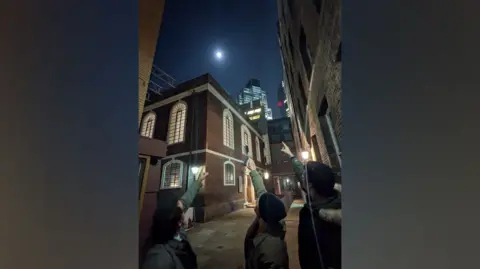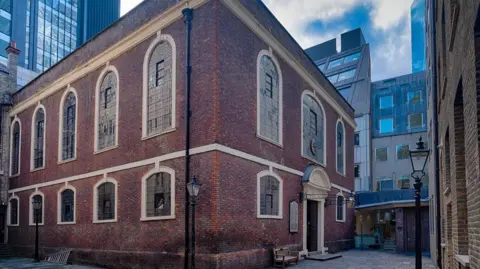UK's oldest synagogue fights City skyscrapers plan
 Bevis Marks Synagogue
Bevis Marks SynagogueThe UK's oldest continuously-run synagogue in the City of London has said it is at risk due to plans for nearby skyscrapers.
The City of London Corporation's draft City Plan 2040 includes plans to add more than a million square metres of office floorspace to the area.
Bevis Marks Synagogue, which was built in 1701, argues that a clear view of the night sky and the moon is necessary for Jewish worship.
The corporation said it believed there were adequate protections in place for the synagogue and that it recognised the place of worship had a "general affinity for the sky".
A spokesman said: "Recognising the exceptional significance of the Bevis Marks Synagogue, the World Heritage Site and St Paul's Cathedral, the plan takes a bespoke and exhaustive approach to tall buildings and heritage.
"In the City of London, growth and conservation combine to define what is unique about the Square Mile, and this is ultimately at the heart of the Plan.
"These policies will ensure development protects and celebrates all our heritage buildings while continuing to support the economic growth of the capital."
Planning adviser Roger Hepher, representing the synagogue, said: "The sky view is very important to the significance of the synagogue. As a place of worship it is fundamentally important."
 Louis Berk
Louis BerkThe synagogue was the first to be built following the re-settlement of Jews in England in the second half of the 17th Century.
Rabbi Shalom Morris described the Grade I listed building as a "national treasure" which would be compromised if its view of the sky was crowded out by nearby development.
Historic England said the corporation's drive for more office space "would lead to significant levels of harm to the historic environment".
Mr Hepher added: "There's not a proper understanding of the importance, the matter of setting and the context of the synagogue particularly, and the importance of maintaining what remains of the open view of the sky."
World Heritage application
Rabbi Morris also revealed the synagogue was intending on applying for "intangible world heritage status" later this year.
This effectively means traditions and events, as well as buildings and built environments, can be afforded levels of protection usually reserved for "tangible" pieces of history and culture.
It is not the first time the synagogue has fought off plans that it said would obscure the surrounding sky view.
Last December plans for a 43-storey skyscraper beside Bevis Marks Synagogue were refused by the City of London Corporation, due to its expected impact on the synagogue.
Listen to the best of BBC Radio London on Sounds and follow BBC London on Facebook, X and Instagram. Send your story ideas to [email protected]
